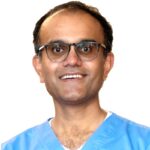
As a healthcare leader who has spent years studying the intersection of technology and patient outcomes, I’ve witnessed numerous supposed “disruptions” to our healthcare system. But the most significant transformation about to hit American healthcare isn’t coming from Silicon Valley, pharmaceutical companies, or traditional reform efforts. Instead, it’s emerging from an unexpected alliance between Donald Trump and Robert F. Kennedy Jr., centered on a radical reimagining of American agriculture.
The implications for healthcare are staggering – and almost entirely overlooked by industry leaders.
When Trump recently proclaimed he would let Kennedy “go wild on the food,” most healthcare executives dismissed it as political theater. But I see something far more consequential: a potential multi-hundred billion dollar restructuring of America’s health ecosystem.

NEMT Partner Guide: Why Payers and Providers Should Choose MediDrive’s TMS
Alan Murray on improving access for medical transportation.
Here’s what healthcare leaders are missing
First, consider this startling reality: while we spend billions on treating chronic diseases, we’ve largely ignored how agricultural practices directly impact public health outcomes. The CDC reports that 60% of Americans have at least one chronic condition, with direct healthcare costs exceeding $1.1 trillion annually. What’s less discussed is how many of these conditions correlate with our industrialized food system.
Kennedy’s proposed agricultural transformation isn’t just about organic farming – it’s effectively a massive preventive health initiative. When he speaks about “getting pesticides out of our food supply,” he’s actually describing one of the largest public health interventions in American history. The medical literature increasingly links common agricultural chemicals to everything from endocrine disruption to neurological conditions, with annual healthcare costs from pesticide exposure alone estimated at $15 billion.
Technology as a catalyst
This agricultural transformation becomes feasible through recent technological advances. AI-powered precision farming systems can now match or exceed conventional yields without chemical inputs. Vertical farming operations, integrated with hospital systems, are already demonstrating how local, organic production can be scaled. These aren’t futuristic concepts – they’re existing technologies waiting for policy alignment.
Dietary interventions can reduce healthcare utilization by up to 30% in certain populations, such as older adults with dementia. Multiply this magnitude of impact across the entire healthcare system, and the economic implications are profound. There is great potential for cutting-edge technologies to improve population health.
The business case for change
Healthcare executives need to understand this goes beyond agriculture and is about fundamentally restructuring healthcare economics. Consider:
– Hospitals spending over $300 billion annually on chronic disease management could see substantial reductions in utilization rates
– Insurance companies could reduce pharmaceutical spending by emphasizing food-based preventive care
– Medicare could save a significant sum in healthcare costs
– Health systems could develop new revenue streams through integrated agricultural operations
The data is compelling. Pilot programs linking organic food access to healthcare outcomes have shown 25% reductions in hospital readmission rates. Some forward-thinking health systems are already preparing, with Cleveland Clinic’s Center for Functional Medicine reporting 40% lower healthcare costs among patients in their food-as-medicine programs.
A new framework for innovation
The convergence of Trump’s political will and Kennedy’s agricultural vision creates unprecedented opportunities for healthcare innovation. Picture hospital systems transformed into agricultural innovation hubs, where vertical farming operations integrate seamlessly with patient care, providing fresh, organic produce while demonstrating measurable health outcomes. Telemedicine platforms could evolve beyond traditional care delivery to offer precision nutrition guidance, powered by AI that analyzes individual health data and dietary patterns. Health insurers are positioned to revolutionize their product offerings with plans that incentivize organic food consumption through premium reductions and expanded coverage options.
Meanwhile, technology companies can develop sophisticated platforms that track and quantify the direct connections between agricultural practices and health outcomes, finally bridging the data gap between what we grow and how it impacts our health. This isn’t futuristic thinking. It’s an immediate opportunity for healthcare leaders who recognize that tomorrow’s healthcare system will be built on the foundation of how we grow our food today.
The proposed policies would fundamentally alter healthcare delivery models. Consider how:
– Medicare could expand coverage for nutritional interventions
– Health systems could receive incentives for sourcing organic products
– Insurance companies could offer premium reductions for documented organic food consumption
– Healthcare providers could prescribe organic foods with insurance coverage
The window of opportunity
Healthcare leaders have a brief window to position themselves ahead of these changes. Those who view this merely as agricultural policy risk missing one of the most significant shifts in healthcare economics in decades.
The convergence of Trump’s political capital, Kennedy’s agricultural vision, and existing technological capabilities creates an unprecedented opportunity to restructure America’s approach to health and disease prevention.
For healthcare executives, the question isn’t whether to engage with this transformation, but how quickly they can adapt their organizations to benefit from it. Those who move first will help shape the future of American healthcare.
The healthcare bombshell isn’t just about changing what we eat – it’s about fundamentally restructuring how we think about, deliver, and pay for health in America. The seeds of this transformation are already planted. The question is: will healthcare leaders recognize and seize this opportunity before it passes?
Photo: fcafotodigital, Getty Images
Neal K. Shah is the CEO of CareYaya Health Technologies, connecting thousands of college students across America to provide companion care for older adults living with dementia. He also serves as Chairman of Counterforce Health, a leading AI platform for helping patients fight health insurance claim denials. He is the author of "Insured to Death: How Health Insurance Screws Over Americans - And How We Take It Back." Shah has led NIH-funded AI innovation research at Johns Hopkins University and the University of Pennsylvania, and has been a featured contributor for CNBC, US News & World Report, Newsweek and Barron’s.
This post appears through the MedCity Influencers program. Anyone can publish their perspective on business and innovation in healthcare on MedCity News through MedCity Influencers. Click here to find out how.









